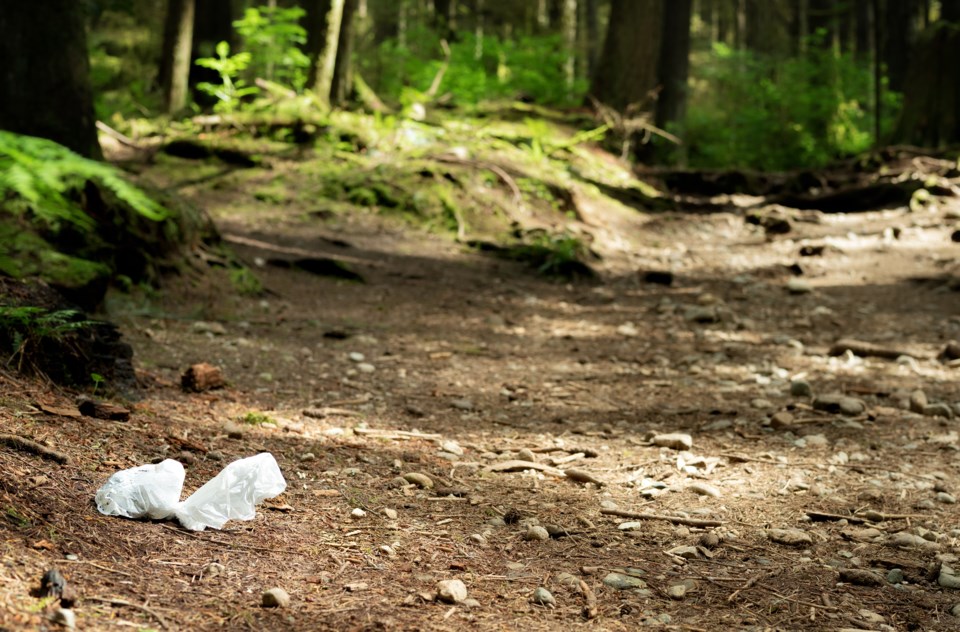In the pantheon of unconscionable, difficult-to-comprehend things people do in Whistler, only one falls so far outside the calculus of comprehension or compassion as to merit its own branch of psychology. A lone act so lacking in logic that it eludes conventional analysis, even beggaring belief among those with only half a conscience. It doesn’t involve clear plastic Tim Hortons cups left at bus stops or on the dock, cigarette butts ground into the dry duff along the Valley Trail, or mylar balloons, sparkles, and paper streamers loosed into the atmosphere from birthdays, grads and other minor human triumphs that find their way into our forests and streams—though all occur with almost daily regularity (and impunity). No, the foul and loathsome plague constellating our community knoweth no special name, but is grievously familiar to all and can be seen literally everywhere: legions of abandoned dog-poop bags.
Now, to offer a scintilla of charity where it’s (possibly) due, not all of these are the result of malign purpose, but of the modern mantra of wanting to get outside, in which the realities of what happens on long, meandering walks (or when you’re stoned—because, Whistler) often scuttles even the best of intentions. As an advice columnist at Outside summed it: “They bag the poop, set it on the side of the trail, then pick it up when they return… [But] it’s an imperfect system. Sometimes you forget. Or it gets dark and you can’t find your goodie bag. Or you hike a loop and return on a different trail. Or a snowstorm blows in. In any event, what was at first a minor inconvenience that would eventually decay or be kicked into the brush is now a biohazard that will last dozens or hundreds of years. In effect you’ve forced someone else to weigh whether they want to carry your dog’s poop.”
You’ll recognize the ones putatively left with hopes of return. They hang on branches like Blair Witch Project decorations and sit proudly at intersections, propped on concrete rails, large rocks and even post boxes. Judging by sheer numbers, one must surmise there are hundreds of forgetful, lost or plain disoriented dog-walkers in Whistler. But like I said, charity.
We have all, of course, noted those left with no intent of return or disposal, chucked into the woods, peeping out from under rocks and logs, or piled in places with an inexplicable expectation of divine pick-up—like the thoughtfully placed mounds tucked behind Resort Municipality of Whistler (RMOW) pump houses, where, I imagine they imagine, someone is paid to clean it up. And here’s where one might advance the occasionally made argument that the RMOW does such a good job of keeping Whistler looking clean and spiffy that people simply assume there’s an army of cleaners fanning out through the streets and forests every night. There isn’t.
To understand the uninformed foolishness doubtless driving this act, let’s go to the hive-mind psychology of online dog-poop discussion groups (legion, BTW) where consensus holds that the real problem begins with those who bag pet poop not because they’re conscientious citizens like the majority of dog owners, but because it’s what society expects dog owners to do and they know they’re being watched. And yes, if I see a leashed dog pooping I unconsciously linger my gaze until I’m sure the owner is bagging the bounty. If I’m walking a dog at the time and have just dropped its own treasure in the trash, I’m somehow even more interested in this outcome. It’s Human Psyche 101: Are you with us or against us? And it’s hard not to notice others casting far-less discreet don’t-you-dares, Argus-eyed stares whose intensity increases with the publicness of the poop place. To complete the online consensus, these folks leave bags on the trail or toss them into the bush when no one is looking because they’re inconsiderate, lazy, and clearly have no respect for the environment or fellow citizens. “What’s the harm in one little bag?” they think.
Well…
In Chinese philosophy, the word Tao refers to an absolute principle underlying the universe that combines the concepts of yin and yang and signifies “the way”—a code of behaviour in harmony with the natural order. Outlined in the ancient text of Lao Tzu’s Tao Te Ching, this interpretation developed into Taoism, which has both religious and philosophical aspects. Let’s forget the religious part and focus on the philosophical: Taoism emphasizes inner contemplation and union with nature; simplicity and letting things take their natural course. Which we could all use a bit of. Leaving your dog’s shit behind in a bag prohibits pretty much everything from taking its natural course—nature, people, even dogs. Otherwise, even with the risk of fecal contamination of watersheds and the transference of disease to wildlife, it’s better to leave poo on the ground than behind in a bag. That’s because other than those that are ASTM D600-certified, even “biodegradable” dog poo bags leach harmful microplastics and release seriously problematic methane (hello, climate). In a commercial composting facility, this can take three months. If the bag is rated for home composting, six months to a year, depending on composting conditions. If it’s tossed into the forest, you’re looking at serious time. Even a traditional polymer bag will eventually degrade, but ecologists say it’ll take 10- to 20 years in the environment and 1,000 years in a landfill.
The true Tao when it comes to dog-poop bags is disposing of them—or at least remembering to—in the many, many, many receptacles provided by your tax dollars. This cleans the slate for everyone and lets everything take its natural course.
Leslie Anthony is a Whistler-based author, editor, biologist and bon vivant who has never met a mountain he didn’t like.




